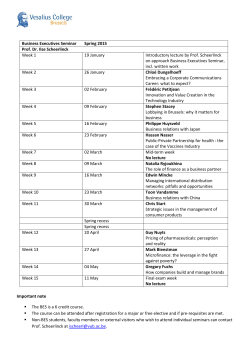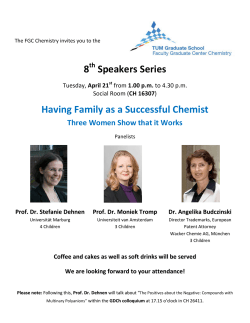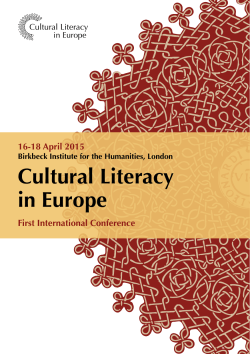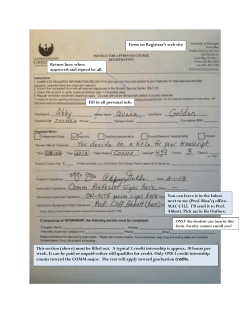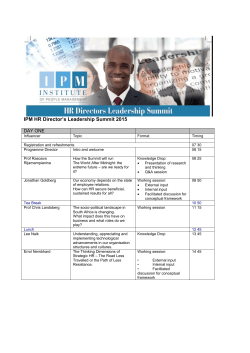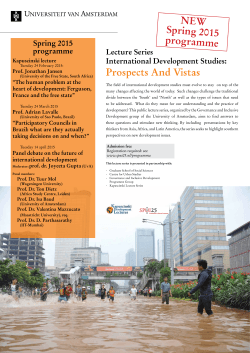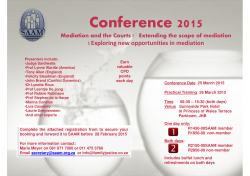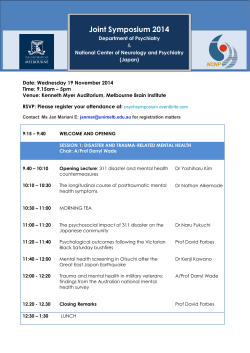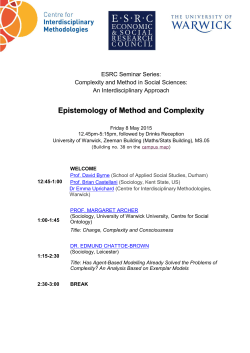
IDEALAB Candidates Miren Arantzeta m.arantzeta.perez [at] rug.nl Academic / personal website Supervisors: Prof. dr. Roelien Bastiaanse (University of Groningen) Prof. dr. David Howard (Newcastle University) Seçkin Arslan seckin.arslan [at] rug.nl Academic / personal website Evidentiality in the brain Evidentiality is linguistic reference to information source, that is, how a speaker knows the information in his statement (e.g., through ‘seeing’ or ‘being told about’ it). All languages have a way of expressing evidentiality. However, in languages such as Turkish, this feature is obligatory in the grammar. How does our brain cope with several information sources in the language, especially when one speaks two languages? To answer this, we use EEG to record brain activity, as well as, eye-tracking and other experimental methods during sentence processing in Turkish. In addition, we study the loss of evidential forms in individuals with aphasia, a speech disorder that renders normal communication impossible due to damage to language areas of the brain. This project will not only show how evidentiality is processed in the brain, but also will reveal how bilinguals cope with it. Supervisors: Prof. dr. Roelien Bastiaanse (University of Groningen) Dr. Claudia Felser (University of Potsdam) http://phd-idealab.com/students.html - 1- © 2015, Katalin Tamási, Universität Potsdam IDEALAB Laura S. Bos l.s.bos [at] rug.nl Academic / personal website People with aphasia (language impairment after brain damage) experience problems with verbs. Particularly, verbs that refer to the past are more difficult than verbs that do not, because the past event has to be linked to the speaker’s here-and-now (discourse-linking). We investigated this impairment in groups of aphasic speakers of Dutch, German and Russian using pen-and-paper tests and eyetracking. We showed electrophysiological brain responses from healthy adults also reflect this discourse-related difference. Further research is needed to investigate what brain region is taxed more for past than nonpast time reference, for the purpose of which we are carrying out an fMRI experiment. Supervisors: Prof. dr. Roelien Bastiaanse (University of Groningen) Prof. dr. Isabell Wartenburger (University of Potsdam) Hui-Ching Chen huiching.chen [at] gmx.de My research interests split into two fields, language acquisition and information structure. Therefore, my PhD project aims at unfolding questions of how children acquire information structure in a crosslinguistical perspective. German, English and Mandarin will be the target languages in my study. To http://phd-idealab.com/students.html - 2- © 2015, Katalin Tamási, Universität Potsdam IDEALAB reach my goal, I will apply experimental methods, such as the picture judgement task and eye-tracking. Supervisors: Prof. dr. Barbara Höhle (University of Potsdam) Professor Stephen Crain (Macquarie University) Vânia de Aguiar vaniadeaguiar [at] gmail.com Academic / personal website My research focuses on language training in both healthy individuals and individuals with post-stroke aphasia, using behavioral techniques and neuromodulation (in particular, tDCS). We look at the behavioral, neurofunctional (fMRI) and neurophysiological (ERPs) effects of training, aiming to understand both the mechanisms of item-specific improvement, and generalization. The behavioral therapy program that we are developing (ACTION; Bastiaanse et al., 1997; de Aguiar et al., submitted) focuses on the production of verbs, verbal morphology and syntactic movement, and was shown to result on both types of improvement. tDCS was shown to enhance item-specific effects, and we assess its potential to enhance generalization. Supervisors: Prof. dr. Gabriele Miceli (University of Trento) Prof. dr. Lyndsey Nickels (Macquaire University) Prof. dr. Roelien Bastiaanse (University of Groningen) Dr. Paul Sowman (Macquaire University) Ekaterina Delikishkina http://phd-idealab.com/students.html - 3- © 2015, Katalin Tamási, Universität Potsdam IDEALAB e.delikishkina [at] unitn.it Academic / personal website The neurofunctional correlates of naming practice Using fMRI and TMS, I am studying how naming practice affects word retrieval processes on the neural level. As suggested by clinical evidence, as well as data from experiments with healthy subjects, words belonging to different grammatical (nouns vs. verbs) or conceptual (objects vs. actions) categories are processed differently in the brain. My aim is to investigate what brain areas are affected by training of nouns as opposed to verbs, and whether naming practice in general involves the language network or rather evokes changes in domain-general regions. Answering these questions would have clear implications for a better understanding of both language learning in healthy individuals and language recovery in aphasic speakers. Supervisors: Prof. dr. Gabriele Miceli (University of Trento) Prof. dr. Roelien Bastiaanse (University of Groningen) Stepan Dubovoy sdubovoy [at] uni-potsdam.de Development of C-V Coarticulation at Preschool Age http://phd-idealab.com/students.html - 4- © 2015, Katalin Tamási, Universität Potsdam IDEALAB Consonants and vowels produced in natural fluent speech can be very different from those produced in isolation. In that respect, coarticulation is an essential phonetic mechanism responsible for fluency in speech. It is described as the influence on every realization of a phonological segment from its surrounding. In a developmental perspective, a crucial problem is how children establish stable relations between language phonemes and their phonetic realization in real speech. It is generally agreed that child productions are less consistent compared to those in adults. This project is aimed at investigating how children develop adult-like coarticulatory stability, with the focus on an important period between 3 and 7 years of age. Such developmental data may be helpful for early detection of speech and articulatorybased deficits. Supervisors: Prof. dr. Barbara Höhle (University of Potsdam) Dr. Aude Noiray (University of Potsdam) Dr. Ghada Khattab (Newcastle University) Leigh Fernandez lfernand [at] uni-potsdam.de There seems to be a link between the brain activity and change in pupil size, but this relationship is murky at best. My research aims to investigate whether there is a relationship between brain activity and pupil change during language comprehension. If we can find and begin to understand this relationship it can open new doors for conducting research with populations that may not be able to give overt responses or cannot endure more invasive testing techniques (e.g. fMRI). For example, we may be able to investigate cognition through pupil change with preverbal infants, and patient populations (e.g. stroke). Supervisors: Prof. dr. Barbara Höhle (University of Potsdam) Dr. Jon Brock (Macquaire University) Prof. dr. Roelien Bastiaanse (University of Groningen) Prof. dr. Lyndsey Nickels (Macquaire University) René Herrera http://phd-idealab.com/students.html - 5- © 2015, Katalin Tamási, Universität Potsdam IDEALAB r.a.herrera.dominquez [at] rug.nl Narrative production in temporal lobe epilepsy patients My research focuses on the study of oral narrative production of patients suffering temporal lobe epilepsy (TLE). Previously, TLE patients’ speech has been described as circumstantial and verbose but the underpinnings of these anomalies has not been explored in depth. In this project, narrative production performance will be correlated to single-word and cognitive abilities. The results will be important to understand of the relationship between language processes and neuropsychological abilities in TLE and neurologically intact individuals. Supervisors: Prof. dr. Roelien Bastiaanse (University of Groningen) Dr. Peter Mariën (Vrije Universiteit Brussel) Rimke Groenewold r.groenewold [at] rug.nl Academic / personal website Nenad Jovanovic http://phd-idealab.com/students.html - 6- © 2015, Katalin Tamási, Universität Potsdam IDEALAB n.jovanovic [at] rug.nl My main interests are the acquisition of langauge in typically and atypically developing children, with a focus on syntax. At the moment, I am investigating the comprehension of passive sentences by Germanspeaking children and adults using eye tracking and EEG, and if the comprehension can be improved through various priming techniques. The ultimate goal is to establish whether children with atypical language development may benefit from priming and improve their comprehension of passive structures, and whether this effect may lead to a “spillover“ effect to other types of sentences. I am also working on a similar transfer of priming in bilinguals. Supervisors: Prof. dr. Barbara Höhle (University of Potsdam) Dr. Kai Alter (Newcastle University) Prof. dr. James Law (Newcastle University) Trudy Krajenbrink trudy.krajenbrink [at] mq.edu.au Academic / personal website Brain damage can cause people to have difficulty spelling. My PhD focuses on 1) the nature of the different types of spelling impairment, and 2) on treatment of these impairments. First, a better understanding of the different types of deficits people can have, can inform our understanding of both the type of impairment, and of the process of spelling in general. Second, treatment for these spelling impairments usually improves the words that have been practiced in treatment, but sometimes untreated words also improve. Surprisingly little is known about this generalisation process: Do treated and http://phd-idealab.com/students.html - 7- © 2015, Katalin Tamási, Universität Potsdam IDEALAB untreated words need to be related? Does the individual’s underlying impairment play a role? Can we predict when generalisation will occur? The second part of my PhD aims to answer these questions through a literature review, as well as a treatment study with two individuals with spelling impairments. A better understanding of generalisation will improve our comprehension of the spelling process and will help make treatments more effective. Anastasia Linnik anastasia.linnik [at] gmail.com Discourse structure and coherence in aphasia Humans’ ability to produce discourse is indispensable for communication. The phenomenon that makes us perceive a group of utterances or sentences put together as connected and clear speech or text is called coherence. We investigate the way people organize their speech in order to make it understandable, and what it is that impedes these processes in aphasia – a language impairment due to stroke. Some people with aphasia learn to fully or partially overcome their language production difficulties over time, while for others language-based interactions remain unavailable, leading to significantly lower quality of life. Our project has implications for clinical practice, and is insightful in terms of еру cognitive processes involved in language production. Supervisors: Prof. dr. Roelien Bastiaanse (University of Groningen) Prof. dr. Barbara Höhle (University of Potsdam) Prof. dr. Manfred Stede (University of Potsdam) Oksana Lyalka o.lyalka [at] newcastle.ac.uk http://phd-idealab.com/students.html - 8- © 2015, Katalin Tamási, Universität Potsdam IDEALAB Mechanisms underpinning facilitation and inhibition in word retrieval We know that retrieval of words with similar meaning differs from those with the different ones. In this study I am exploring how different features of a word impact the speed of its production. First, by means of RTs measurement I will examine whether different semantic features affect time of word retrieval. Afterward, using ERP technique I will measure whether these timing effects occur at the same time course or at different ones. Implementation of this research will help us understand the nature of organization of the semantic system and may be used for developing testing and treatment tools in aphasia. Supervisors: Prof. dr. David Howard (Newcastle University) Prof. dr. Lyndsey Nickels (Macquaire University) Tina Marusch tina.marusch [at] students.mq.edu.au Academic / personal website Language production of verbal inflectional morphology in healthy and impaired adult speakers of German and English. Supervisors: PD Dr. phil. habil. Frank Burchert (University of Potsdam) Prof. dr. Lyndsey Nickels (Macquarie University) Michela Mosca http://phd-idealab.com/students.html - 9- © 2015, Katalin Tamási, Universität Potsdam IDEALAB mosca [at] uni-potsdam.de In my research, I focus on the mechanism that underpins multilinguals' language control. To examine this topic, I measure switching costs during picture naming tasks with language mixing in different types of multilinguals (bilinguals and trilinguals). Specifically, I am interested in understanding what factors might play an influential role during language switching (i.e. preparation time, age of language acquisition, proficiency and status). Supervisors: Prof. dr. Harald Clahsen (University of Potsdam) Prof. dr. Cornelis L. J. de Bot (University of Groningen) Katharina Nimz katharina.nimz [at] uni-potsdam.de Sound perception and production in a foreign language: Does orthography matter? Supervisors: Prof. dr. Adamantios Gafos (University of Potsdam) Dr. Ghada Khattab (Newcastle University) Rui Qin http://phd-idealab.com/students.html - 10 - © 2015, Katalin Tamási, Universität Potsdam IDEALAB r.qin [at] rug.nl Supervisors: Prof. dr. Ben Maassen (University of Groningen) Prof. dr. Barbara Höhle (University of Potsdam) Prof. dr. Isabell Wartenburger (University of Potsdam) Adrià Rofes adria.rofes [at] unitn.it Academic / Personal website I work on the cortico-subcortical correlates of noun and verb production in aphasia and their application to awake surgery procedures. I am particularly interested in improving the assessment of patients with brain tumors before, during, and after surgery. This research is informative for clinicians and researchers. Supervisors: Prof. dr. Gabriele Miceli (University of Trento) Prof. dr. Roelien Bastiaanse (University of Groningen) Prof. dr. Lyndsey Nickels (Macquaire University) Molood Sadat Safavi http://phd-idealab.com/students.html - 11 - © 2015, Katalin Tamási, Universität Potsdam IDEALAB safavi [at] uni-potsdam.de My current research is focused on the role of predictability in sentence processing through experimental approaches such as eye-tracking, self-paced reading, etc. To be specific, I investigate two contradicting accounts of locality and expectation based on Persian complex predicates. Supervisors: Shravan Vasishth (University of Potsdam) Prof. dr. Roelien Bastiaanse (University of Groningen) Katalin Tamási tamasi [at] uni-potsdam.de Academic / personal website We are extremely sensitive to small changes made to words; for example, we can distinguish 'baby' from 'vaby' with ease. This shows that we know a lot about how words are built up. However, it is still unclear when and how such knowledge arises: Are children aware of word structures before they learn to speak or, rather, they learn them as their vocabulary grows? In our research, we use pupillometry to measure how sensitive young children are to changes made to words: Are they able to appreciate the difference between correctly pronounced and slightly mispronounced words (such as 'baby' and 'vaby')? This way, we can determine what children know about words and maybe even track the emergence of such knowledge. Supervisors: Prof. dr. Barbara Höhle (University of Potsdam) Dr. Cristina McKean (Newcastle University) Prof. dr. Adamantios Gafos (University of Potsdam) http://phd-idealab.com/students.html - 12 - © 2015, Katalin Tamási, Universität Potsdam IDEALAB Jinxing Yue j.yue2 [at] nlc.ac.uk Academic / personal website My project is to investigate the cortical rapid plasticity of human auditory cortex to form long-term memory trace of novel word forms. Using novel tonal words derived from Mandarin Chinese, we want to know 1) how to measure the rapid neural changes with neurophysiological method and behavioural measurements, and 2) in what condition, the long-term neural plasticity would occur rapidly in human cortex. Supervisors: Dr. Kai Alter (Newcastle University) Prof. dr. Roelien Bastiaanse (University of Groningen) Prof. dr. David Howard (Newcastle University) Fleur van Ierschot fleur.vanierschot [at] unitn.it Academic / personal website Gliomas are a type of brain tumours that are often infiltrated in crucial language areas. In order to http://phd-idealab.com/students.html - 13 - © 2015, Katalin Tamási, Universität Potsdam IDEALAB diminish post-operative impairments, preservation of linguistic functions is monitored using direct electrical stimulation during awake surgery. Not only can essential and mediating structures be clinically distinguished with this procedure, but also does it provide an excellent tool to inspect neuropsychology of language and its fundamental underlying mechanisms. My research focuses on pre-, intra- and postsurgery assessment of the crucial and complex processes of reading and writing in glioma patients who undergo awake surgery. Supervisors: Prof. dr. Gabriele Miceli (University of Trento) Prof. dr. Roelien Bastiaanse (University of Groningen) Miren Arantzeta Seçkin Arslan Adrià Rofes m.arantzeta.perez [at] rug.nl seckin.arslan [at] rug.nl adria.rofes [at] unitn.it Leigh Fernandez René Herrera lfernand [at] uni-potsdam.de r.a.herrera.dominguez [at] rug.nl Vânia de Aguiar vaniadeaguiar [at] gmail.com ??????? http://phd-idealab.com/students.html - 14 - © 2015, Katalin Tamási, Universität Potsdam IDEALAB Oksana Lyalka Michela Mosca o.lyalka [at] newcastle.ac.uk mosca [at] uni-potsdam.de katharina.nimz [at] unipotsdam.de Katharina Nimz /////// Rui Qin r.qin [at] rug.nl Tina Marusch Katalin Tamási tina.marusch [at] students.mq.edu.au tamasi [at] uni-potsdam.de ////// Jinxing Yue http://phd-idealab.com/students.html Molood Sadat Safavi Trudy Krajenbrink - 15 - © 2015, Katalin Tamási, Universität Potsdam IDEALAB j.yue2 [at] nlc.ac.uk trudy.krajenbrink [at] mq.edu.au safavi [at] uni-potsdam.de ? ////// Anastasia Linnik anastasia.linnik [at] gmail.com Ekaterina Delikishkina e.delikishkina [at] unitn.it Fleur van Ierschot fleur.vanierschot [at] unitn.it ////// Stepan Dubovoy sdubovoy [at] unipotsdam.de Nenad Jovanovic n.jovanovic [at] rug.nl Hui-Ching Chen huiching.chen [at] unitn.it Alumni http://phd-idealab.com/students.html - 16 - © 2015, Katalin Tamási, Universität Potsdam IDEALAB Laura S. Bos Rimke Groenewold l.s.bos [at] rug.nl r.groenewold [at] rug.nl http://phd-idealab.com/students.html - 17 - © 2015, Katalin Tamási, Universität Potsdam
© Copyright 2025
